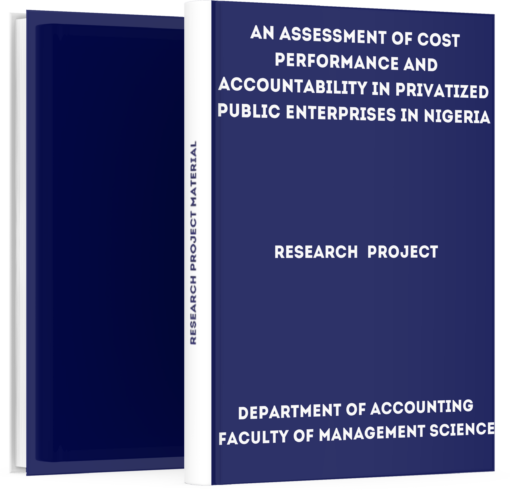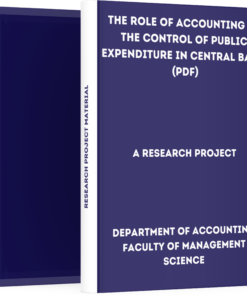An Assessment of Cost Performance and Accountability in Privatized Public Enterprises in Nigeria
₦3,000.00
If you are interested in getting this project material “An Assessment of Cost Performance and Accountability in Privatized Public Enterprises in Nigeria”, click on the DOWNLOAD BUTTON to make payment and the file will be delivered to your email immediately after confirmation.
Description
– An Assessment of Cost Performance and Accountability in Privatized Public Enterprises in Nigeria –
Download An Assessment of Cost Performance and Accountability in Privatized Public Enterprises in Nigeria. Students who are writing their projects can get this material to aid their research work.
Abstract
Despite an impressive level of privatization activity across Africa and the upsurge in search of the operating performance of privatized firms in both develop and developing economies, our empirical knowledge of the privatization program in Africa is limited.
The purpose of this study is to appraise the post privatization cost and operating performance as well as accountability of some privatized public enterprises in Nigeria.
A survey research design was adopted for the study, sixty five internal audit and thirty five accounting. Totally one hundred was randomly sampled and stratified among the staff of Oando plc Enugu state.
Three research questions and hypothesis tested at 0.05 percent level of significance guided the study. Frequencies, percentages, mean and standard deviation were employed to answer the research questions while Z-test statistics were used to test the hypothesis.
It was found that privatization of unipetrol has led to efficient and improved cost performance, and proper accountability to share holders. We conclude and recommend among others that effective cost performance and proper accountability to share holders is very necessary in privatized public enterprises
and that government should prive the entire necessary enabling environment for the privatized company to carry out their activities without unnecessarily increasing their cost.
Introduction
1.1 Background of the Study
Privatization of state-owned enterprises has become an important phenomenon in both developed and developing countries. Over the last decade, state-owned enterprises (SOEs) have been privatized at an increasing rate, particularly in developing countries (DCs).
Privatization has become an important phenomenon in both developed and developing countries. Over the past decade, privatization attempts have been occurring at an increasing rate, especially in developing countries.
The compound annual average growth rate was around 10% between 1990 and 2000, with global privatization revenues jumping from $25 billion in 1990 to $200 billion in 2000.
The number of countries that have implemented privatization policies has exceeded 110, not to mention that privatization has touched almost every aspect of economic activity (Shadeh, 2002).
Privatization of state-owned enterprises (SOEs) has become a key component of the structural reform process and globalization strategy in 13 many economies.
Several developing and transition economies have embarked on extensive privatization programmes in the last one and a half decades or so, as a means of fostering economic growth, attaining macroeconomic stability, and reducing public sector borrowing requirements arising from corruption, subsidies and subventions to unprofitable SOEs.
By the end of 1996, all but five countries in Africa had divested some public enterprises within the framework of macroeconomic reform and liberalization (White and Bhatia, 1998).
In line with the trend worldwide, the spate of empirical works on privatization has also increased, albeit with a microeconomic orientation that emphasizes efficiency gains (La Porta and López-de-Silanes, (1997); Boubakri and Cosset, (2001); Dewenter and Malatesta, (2001) D’Souza and Megginson, (2007).
Yet, despite the upsurge in research, our empirical knowledge of the privatization programme in Africa is limited. Aside from theoretical predictions, not much is known about the process and outcome of privatization exercises in Africa in spite of the impressive level of activism in its implementation
How to Download this Project Material
First, note that we are one of the best and most reliable online platforms because we don’t retain any of your personal information or data as regards making payments online.
PRICE: ₦3,500 ₦3,000 (Three Thousand Naira Only)
Make a bank deposit or mobile transfer of ₦2,000 only to the account given below;
Bank Name: UBA Account Number: 1022564031 Account Name: TMLT PRO SERVICES
After making the payment, CLICK HERE to send the following on WhatsApp;
- Depositor’s Name or Screenshot of Payment
- Name of the Past Question
- Active Email Address
or Call Us On +2348082284439 Once your details have been received and your payment confirmed by us, you will receive the past question in your email or WhatsApp within 5 Minutes.
Guarantee of Getting the Material
We understand that due to the high rate of fraud, many people are afraid of making purchases online but be rest assured that PastExamQuestions will deliver your material after payment.
Once your details have been received and your payment confirmed by us, you will receive the past question in your email or WhatsApp.
Give us Feedback
Have we been able to satisfy you? How well do you think the material will be helpful after having gone through it? Does the price worth the material?
Let’s hear from you! We recommend that our customers give feedback at the end of every transaction to enable us to serve better. You can do this by clicking the review button on this page.
Where is the review button? >> Just scroll up to where you see reviews





Reviews
There are no reviews yet.